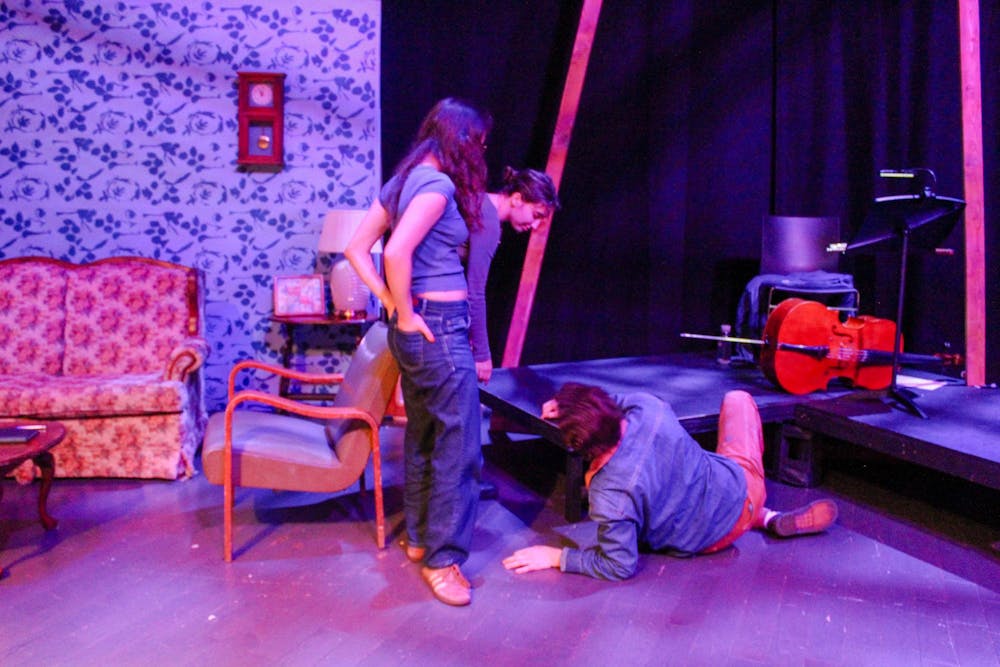Whether mourning the tragic fact that a human cannot be a nose or having an epiphany during a rowdy game of “Duck, Duck, Goose,” student theater group Something on The Green’s “Melancholy Play” has a bit of absurdity for everyone.
Written by Sarah Ruhl ’97 MFA’01, the show was presented this past weekend in the Fishman Studio at the Granoff Center for the Creative Arts. The show follows a variety of satirical characters as they grapple with love, melancholy and almonds.
The playbill included a note from director Zoe Redlich ’25 urging audience members to “indulge in a bit of melancholia on a rainy afternoon,” as well as a special thanks to the Rhode Island School of Design’s “almond printer” — both of which set the scene for the evening.
The play, which the playbill states Ruhl wrote during her time at Brown, opens with four propositions in defense of melancholy. A singular cellist (Elvin Choi ’25) served as the musical accompaniment. The story soon introduced Lorenzo The Unfeeling (Zane Elinson ’28), an orphan found on the steps of a candy store in an “unspecified European country.” Once Lorenzo grows up, he works as a psychiatrist and meets the dramatically melancholic Tilly (Lane Bynum, a RISD sophomore), a bank worker with whom he quickly and hysterically falls in love.
Even in the opening scene, “Melancholy Play” establishes a poetic, yet comedic tone. The dialogue weaves in and out of both vivid language — with Tilly criticizing the “bells in (people’s) teeth that ring when they smile” — and absurd moments of comedy, such as Lorenzo smelling Tilly’s hair and mourning, “if only my entire being were one big nose.”
The entire cast of the show ultimately falls in love with Tilly’s sad, poetic outlook on life, including Frank the suit maker (Brodie Gross ’28), Frances the hairdresser (Amelia Clark ’28) and Joan the nurse (Julie Chung ’26).
Even during her haircut with Frances, Tilly imagines all the secrets that have been confessed during every haircut ever, later refusing to look in the mirror as she “would hate for it to be over.” After getting dangerously close to each other’s faces for an uncomfortable length of time, they ultimately end up bonding over their shared love for that time of the afternoon.
Meanwhile, the mixture of poetic melancholy and wild satire continues as Tilly navigates her relationship with Frank, who saves her tears in a vial after wringing out his handkerchief. The writing pokes fun at the world’s love for Tilly, with her exclaiming that “I don’t get in trouble with policemen when I cry” and “I go to therapy and my therapist falls in love with me. I have to be careful.”
The show takes yet another wild turn as Tilly suddenly becomes ecstatic, breaking out into song and telling her friends that “life really does have moments of transcended beauty” during a game of “Duck, Duck, Goose.”
Her sudden shift in demeanor and abandonment of melancholy lead Frank, Lorenzo, Joan and Frances to lose interest in her.
“I don’t feel sexually aroused at this junction,” Frank tells her after learning of her newfound joy.
Overcome by sadness from Tilly’s transition to gaiety, Frances then turns into an almond, and the characters spend the rest of the show trying to transform her back.
Towards the very end, the cello player steals the show after stopping his music, breaking the fourth wall and meekly saying “hi” to the characters on stage.
SOTG’s “Melancholy Play” takes audience members through a farcical and wildly comedic evening, leaving viewers entertained — and a little bit melancholic that it ended.





